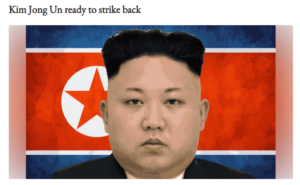The Implications of Trump’s Potential Reunion with Kim Jong-un: A Look at North Korea’s Evolving Threat

In an era where diplomacy seems increasingly strained, Donald Trump’s approach of engaging directly with world leaders stands out as both bold and controversial. With rising tensions surrounding North Korea’s involvement in international affairs, particularly in the context of the Russia-Ukraine conflict, many are questioning the effectiveness of conventional diplomatic channels. Remarkably, few can match Trump’s historic visit to North Korea, where he became the first sitting U.S. president to cross the DMZ line into the enigmatic regime.
Trump and Kim: A Diplomatic Dynamic
Trump’s assertion that he plans to reach out to Kim Jong-un again underscores a significant shift in how Washington has approached Pyongyang. “Kim Jong-un is a smart man. He likes me, and I get along well with him,” Trump claimed previously. This statement isn’t merely boastful; it reflects a rare mutual respect that has emerged between leaders on polar opposite sides of global politics. During their initial meetings—in particular, the much-publicized summit in Singapore—there were high hopes for progress. However, the outcomes did not lead to substantive actions that addressed the growing threat posed by North Korea’s nuclear ambitions.
North Korea: An Escalating Threat
In recent years, North Korea’s military posture has evolved dramatically. The hermit kingdom’s nuclear capabilities have surged alarmingly, evidenced by Kim’s increasing aggressiveness in missile testing. Reports indicate that North Korea has deployed approximately 120,000 troops to support Russia amid the ongoing conflict, a move that heightens concerns about regional security. As the geopolitical landscape shifts, it’s evident that North Korea poses a more imminent threat than ever, with intercontinental ballistic missiles potentially capable of reaching U.S. soil.

A spokesperson for the South Korean Foreign Ministry recently reiterated the principle of North Korea’s denuclearization supported by the international community, including the U.S. and South Korea. However, North Korea’s response has been defiant, threatening nuclear retaliation against perceived threats to its sovereignty.
The Stalemate of Sanctions and Diplomacy
What does this mean for international diplomacy? Evidence suggests that traditional measures like tariffs and sanctions have had little to no impact on North Korea’s resolve. Analogous to Russia’s situation, North Korea is fighting for its very survival, with the threat of nuclear weapon use hanging in the balance. The strategic support it receives from its neighbors, China and Russia, offers a temporary lifeline, but their economies are struggling—and this trickles down to a populace enduring severe hardships and starvation due to poor harvests and an ailing economy.
Interestingly, our proprietary model at Extreme Investor Network predicts an uptick in the 72-year Revolutionary Cycle for North Korea around 2025. This suggests that we might be on the verge of significant change—whether for better or worse remains to be seen.
Conclusions: What Lies Ahead?
As discussions of a potential new meeting between Trump and Kim reignite, one can’t help but wonder what new strategies or compromises will emerge. Will Trump manage to craft a deal that can stabilize the region, or will Kim’s entrenched positions render negotiations futile once again?
North Korea serves as a critical case study of the challenges and complexities that define modern diplomacy. It reminds us that while direct engagement can foster relationships, the underlying geopolitical realities often dictate the outcomes. As we at Extreme Investor Network continue to monitor these developments, we urge readers to stay informed and engaged. The stakes are high—not just for North Korea and its neighbors, but for global stability as a whole.
Stay tuned for more insights and analysis at Extreme Investor Network as we unpack the implications of these geopolitical maneuvers.

